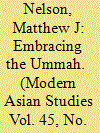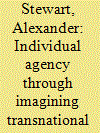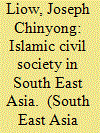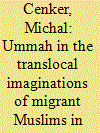|
|
|
Sort Order |
|
|
|
Items / Page
|
|
|
|
|
|
|
| Srl | Item |
| 1 |
ID:
105024


|
|
|
|
|
| Publication |
2011.
|
| Summary/Abstract |
Studies of student politics in Pakistan often focus on the competition between 'secular' and 'religious' student groups-for example, the leftward-leaning National Students Federation, regional parties with a broadly secular orientation like the Pakhtun Students Federation, the Islami Jamiat-e-Tuleba (Islamic Students Association), and sectarian groups like the (Shi'a) Imamia Students Organization. This paper describes the emergence of an increasingly violent stalemate between and amongst these groups since the 1960s. It then argues that for a growing number of students this stalemate produced a certain disenchantment with exclusionary efforts to control the 'state-based Muslim nationalism' that lay behind the formation of Pakistan itself. Seeking alternatives, these disenchanted students developed an interest in non-state-based forms of Muslim solidarity-forms that rejected the constraints of territorial Muslim nationalism in favour of transnational movements focused on the revitalization of Muslim solidarity on a truly global scale-movements like the (Deobandi) Tablighi Jama'at and the (Barelwi) Da'wat-e-Islami. Tracing this development, this paper takes up one application of Talal Asad's argument that alternative expressions of religion (and religious solidarity) are 'produced' by specific political circumstances. It also examines this formulation in the light of other theories that take an interest in the effects-indeed the potentially 'democratizing' effects-of protracted political stalemates.
|
|
|
|
|
|
|
|
|
|
|
|
|
|
|
|
| 2 |
ID:
144899


|
|
|
|
|
| Summary/Abstract |
This study examines subjective, social, and transnational aspects of conversion to Islam in modern China by examining the “conversion careers” (Gooren (J Sci Stud Relig 46(3):337–353, 2007), 2010) of seven “new Muslims” who reside in and around Xining, Qinghai Province. Examining their experiences that include pre-conversion socialization, initial encounters with Islam, study of the faith, conversion, and expressions of a new Muslim identity reveals a complex interaction between sociocultural circumstances and individual agency. Rather than gradually succumbing to local ideas of Islamic orthodoxy or passively obeying religious authorities, converts study Islamic texts, form a variety of interpretations, and express their newfound belief in various individual and collective ways that often conflict with social expectations, local Islamic norms, and moral authority of the Chinese state. Converts draw confidence to pursue these conversion careers by believing in the universality of their faith and imagining themselves as part of a transnational community that shares their interpretations of Islam. Thus, conversion to Islam can be seen as compatible with, or even the product of, modern trends of increasing rationality, individual agency, and transnational identity.
|
|
|
|
|
|
|
|
|
|
|
|
|
|
|
|
| 3 |
ID:
101346


|
|
|
| 4 |
ID:
138242


|
|
|
|
|
| Summary/Abstract |
This study draws from ethnographic data of a scarcely researched region of Central Europe to show how migrant Muslims in Slovakia confront everyday translocality by reifying a single community of Muslims. This symbolic community is articulated in the concept of the ummah. Muslims in Slovakia are mostly migrants, since formation of a larger “native” Muslim population was historically limited. It will be argued that ummah is an imagined community that translates the political and religious narratives of a global Muslim community into the local group of Muslims and, in such way, enables Muslims to transcend mutual ethnocultural, national and social heterogeneity. Furthermore, this study will show four different ways how the ummah as an imagined single community is reified: (1) ummah as a set of functional networks; (2) ummah as a symbol to interpret migrant experience; (3) ummah as a network of trust; and (4) ummah as a symbol in political narratives.
|
|
|
|
|
|
|
|
|
|
|
|
|
|
|
|
|
|
|
|
|